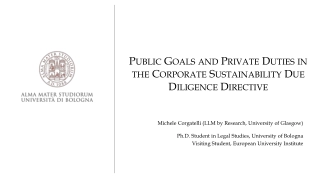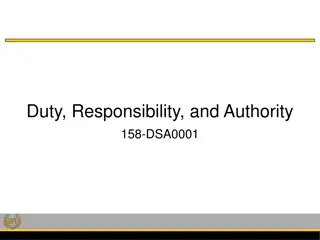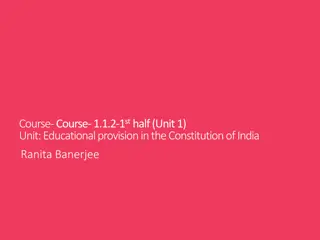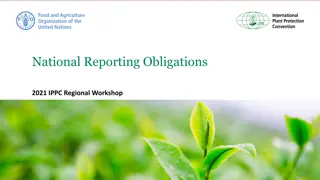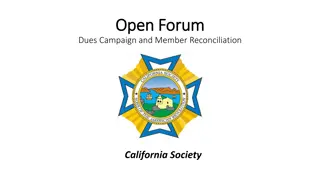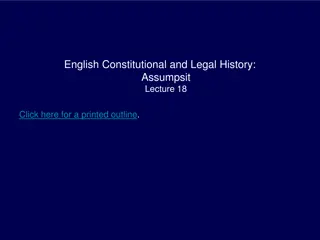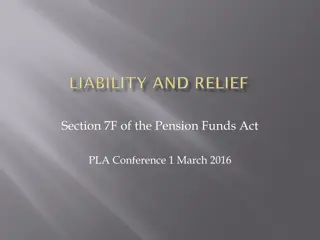Duties and Obligations in Society
Duty is a commitment to perform actions, moral and legal obligations enforced by the state to protect rights. Explore types and classifications of duties like moral, legal, primary, secondary, positive, and negative duties.
Download Presentation

Please find below an Image/Link to download the presentation.
The content on the website is provided AS IS for your information and personal use only. It may not be sold, licensed, or shared on other websites without obtaining consent from the author.If you encounter any issues during the download, it is possible that the publisher has removed the file from their server.
You are allowed to download the files provided on this website for personal or commercial use, subject to the condition that they are used lawfully. All files are the property of their respective owners.
The content on the website is provided AS IS for your information and personal use only. It may not be sold, licensed, or shared on other websites without obtaining consent from the author.
E N D
Presentation Transcript
Duty By Dr Pramod Kumar
Duty A duty (from due meaning that which is owing ; Old French: deu, did, past participle of devoir; Latin: debere, debitum, whence debt ) is a commitment or expectation to perform some action in general or if certain circumstances arise. A duty is an obligatory act a person has to perform in favour of another person. If the person has breached his duty and infringed anyone right then he has to suffer consequences arisen from the breaching the right.
Definitions Keaton A duty is an act which should be enforced by the state in preserving the rights given to the people and also in order to protect the interest of the people. Salmond A duty is an act which every citizen have obliged to perform, in furtherance of protecting the rights of the other people.
Kinds of Duty A duty is of two kinds 1. Moral Obligation /Duty and 2. Legal Obligation/Duty Moral/Obligation Duty :- Moral duty is a duty arising out of considerations of right and wrong. It is a duty arising from ethical motives, or a mere conscientious duty, unconnected with any legal duty, perfect or imperfect, or with the receipt of benefit by the promisor of a material or pecuniary nature. Moral duty springs from a sense of justice and equity that an honorable person would have, and not from a mere sense of doing benevolence or charity. One of the most common examples is this: you're walking along and you see a small child fall into a well. I know there aren't many wells around anymore, but that's just what happens, okay? Do you feel a moral duty to act? Of course you do! Since we value human life, especially that of a child, then you have a moral duty to act and try to help get this kid out of the well. 1.
Kinds of Duty 2. Legal Obligation/Duty: Obligation arising from operation of law, a breach of which would constitute (illegality). A legal obligation, the breach of which can result in liability. In a lawsuit a plaintiff must claim and prove that there was a duty by defendant to plaintiff. This can be a duty of care in a negligence case or a duty to perform in a contract case. a legal wrong
Classification of Duties Duties are classified under the following categories:- Primary and Secondary Duties A primary duty which is independent of any other duty and does not have to depend upon other duties. Example: to forbear from causing personal injury to another is a primary duty. On the other hand secondary duty is one which has no independent existence enforcement of other duties. It is also known as a remedial duty or sanctioning duty. Example: a duty to pay damages for the injury already done to a person. but exists only for the
Classification of Duties Positive and Negative Duties Duties which is prescribed by Law is Positive Duty and which is prohibited by the Law is called the Negative duty. If a person owes a debt to another, he is under a duty to pay-off the amount of debt. This is positive duty. A negative duty is that if a person has a right to a land, others are under a corresponding duty not to interfere with that person s exclusive use of land. Thus a negative is not capable of being extinguishing by fulfilment.
Classification of Duties Absolute and Relative Duties Austin has classified duties into absolute and relative. Relative duties are that duty which is related to some right and absolute rights are those which does not relate with any right. Austin also given classify absolute rights Self-regarding duties such as a duty not to commit suicide or not to consume drugs or liquor, etc. Duties towards society e.g. a duty not to commit a nuisance. Duties towards other than human beings such as duty towards God or animals, birds, etc. Duty towards the sovereign or the state. Dr. Allen also supports Austin s view that a duty owned to the State is absolute and there are no co-relative rights in the State.
Duties enriched under Indian Constitution Article 51A of the constitution of India guarantees certain duties to every citizen of India. Article 51 A of the Indian constitution states that it shall be the duty of every citizen of India To respect the provisions of Constitution and respect the National Flag and National Anthem; To safeguard the sovereignty and integrity of India; To follow the noble ideals of national struggle To defend the country and contribute to national service when called To preserve the national heritage of the country ; To promote and maintain the harmony of brotherhood amongst people of India. To protect the dignity of women To protect the natural habitat and wildlife; To protect public property and to avoid violence; To contribute to the development of the nation in all spheres. including forests, lakes, rivers, and
A comparative study between Fundamental duties and Fundamental rights Fundamental Rights and Fundamental Duties both emanate from the Constitution and the difference therein lies between the connotation of the terms Rights and Duties A Fundamental right is guaranteed to all citizens and is enforceable by the law if any of the Fundamental rights of an individual is violated then the person has the right to move in the court. Therefore, an individual right to free speech, education, shelter etc. are your fundamental rights impregnable, untouchable and unfettered (subject to reasonable restraints in the interest of national security, public order, decency, morality, etc). Therefore, in the concept of rights, it can be said that they are legally recognizable.
A comparative study between Fundamental duties and Fundamental rights Fundamental duties are not legally enforceable. It the duty of the states and individuals to perform their part of duty for the welfare of the society. So the duty to preserve your heritage, to respect national symbols, to keep your surroundings clean et al is a duty which one cannot have redress against in the Courts but in good faith is expected to follow to ensure a well-functioning society. Therefore, it can be said that the duty is moral in nature, they are no sanction if one does not perform their duty but if the rights are violated then the there are legal sanction of infringing one right of enjoying.



